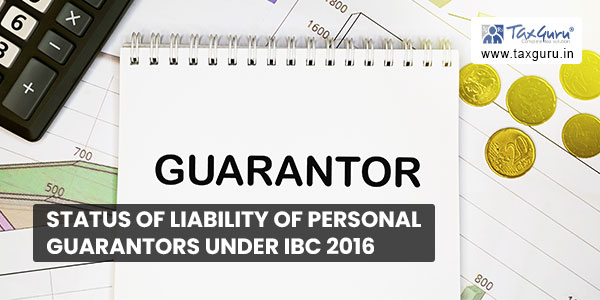Status of Liability of Personal Guarantors under the Insolvency and Bankruptcy Code, 2016 (IBC 2016)
The law of Insolvency and Bankruptcy has been newly harvested and on account of this, various situations arise day-in and day-out concerning different provisions of this law and their implementation which not only causes ambiguity and confusion but also demands a legal interpretation of such provisions for achieving the purpose of this act, which is to provide a streamlined and faster process for dealing with the insolvency of individuals and corporate entities. One such topic which has been the talk of the town since the inception of this very law is the “Liability of the Personal Guarantors” under the present law.
It would not be out of order to mention here that, the law of contract i.e., Indian Contract Act, 1872 recognizes the liability of the surety and finds the same at par with the principal borrower. This article is an attempt to decode the confusion revolving around the liability of the personal guarantors and to bring out the actual position of law concerning the topic at hand.
The law of Insolvency and Bankruptcy acknowledges the concept of moratorium during the Corporate Insolvency Resolution Process initiated against the Corporate Debtor which involves an absolute bar on the institution/ continuation of suits or proceedings against the corporate debtor, transferring, alienating, or disposing of any assets as well as any action to foreclose, recover or enforce any security interest created by the corporate debtor in respect of its property.

Now, the foremost question which arises here is “whether the moratorium under section 14 of the Code is applicable upon the Personal Guarantor as well?”
The abovementioned question came for discussion for the first time in the matter of State Bank of India Vs. V. Ramakrishnan and another, wherein the Hon’ble Apex Court clarified the position of law in this context and categorically stated that the moratorium under section 14 of the Code is meant to apply only on the corporate debtor and personal guarantors are not in the purview of the same, this specifies that the assets of the personal guarantors will remain un-touch and will be outside the scope of the moratorium imposed under the present law. Further, the Apex Court went on to say that, a creditor has a dual remedy of seeking its claim either from the principal debtor or the surety or both. Hence, the Hon’ble Apex Court held that it can never be the intent of the legislature to provide the personal guarantor an escape from the coextensive liability to pay off the entire outstanding debt.
Now going further, it is essential to determine whether a creditor must initiate a corporate insolvency resolution process against a Corporate Debtor before initiating the same against a Corporate Guarantor?
Apart from this, it is also vital to known whether corporate insolvency resolution process can be initiated against two Corporate Guarantors parallelly for the same set of debt and default?
The Hon’ble National Company Law Appellate Tribunal raised the curtains from the above raised two questions in the matter of Dr.Vishnu Agarwal Vs. Piramal Enterprises Ltd (which is under challenge before the Hon’ble Supreme Court of India) wherein, the Hon’ble Tribunal gave its finding in dissident, hence it can be said that although there is no restriction in initiating proceedings against the Corporate Guarantor even though no such proceeding has taken place against Principal borrower once the application has been admitted for one of the two proceedings for the same set of debt and default thereafter, another application will not be entertained.
Going ahead further, The Hon’ble National Company Law Appellate Tribunal in the matter of State Bank of India Vs. Athena Energy Ventures Private Limited took a U-turn from its verdict in Piramal Judgement and held that simultaneous initiation of CIRP against a Principal Borrower and Corporate Guarantor is permissible under the IBC.
Further, confirming that there is no escape route for the personal guarantor of the Corporate Debtor in discharging its obligation as a surety, the Hon’ble Apex Court in Lalit Kumar Jain Vs. Union of India & Ors. held that approval of a resolution plan does not ipso facto discharge a personal guarantor of her or his liabilities under the contract of guarantee.
Hence, after witnessing the takeaways from the judgements cited above, it can be rightly concluded that the personal guarantors of a corporate debtor are vicariously liable for the debts or defaults of the corporate debtor.





